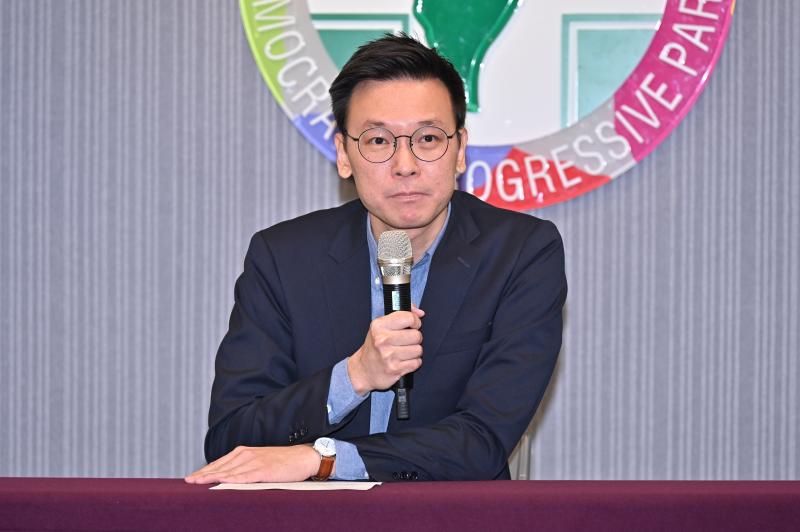Democratic Progressive Party (DPP) legislative candidate Lin Fei-fan (林飛帆) on Tuesday dropped out of the race following controversy around the party’s handling of a sexual assault allegation last year.
At a news conference called in the afternoon, the former DPP deputy secretary-general apologized for the turmoil caused by the controversy, saying he decided to withdraw from the election to ensure that the focus remains on reform, not politics.
“The outbreak of these incidents represents a long-standing issue in society, but it is also an opportunity to collectively relearn,” he said. “I hope my withdrawal from the election will stop the movement from being disturbed by political attacks and focus attention on systemic reform.”

Photo: Tu Chien-jung, Taipei Times
On May 31, a former DPP employee accused Hsu Chia-tien (許嘉恬), then-leader of the party’s Women's Development Department, of ignoring and belittling her report of sexual harassment by a director hired to shoot a video for the party.
The DPP’s Gender Equality Committee conducted an investigation into the matter, and on Friday last week announced it found Hsu had acted inappropriately.
Although the committee found no fault with Lin’s conduct, as it was Hsu’s responsibility to report the incident to him, he told the news conference on Tuesday that he should be held to high standards as supervisor of the department and assume responsibility.
The Sunflower movement leader had announced his bid two weeks ago to represent Taipei’s Zhongshan (中山) and northern Songshan (松山) electoral district.

Chinese Nationalist Party (KMT) Chairman Eric Chu (朱立倫), spokeswoman Yang Chih-yu (楊智伃) and Legislator Hsieh Lung-chieh (謝龍介) would be summoned by police for questioning for leading an illegal assembly on Thursday evening last week, Minister of the Interior Liu Shyh-fang (劉世芳) said today. The three KMT officials led an assembly outside the Taipei City Prosecutors’ Office, a restricted area where public assembly is not allowed, protesting the questioning of several KMT staff and searches of KMT headquarters and offices in a recall petition forgery case. Chu, Yang and Hsieh are all suspected of contravening the Assembly and Parade Act (集會遊行法) by holding

PRAISE: Japanese visitor Takashi Kubota said the Taiwanese temple architecture images showcased in the AI Art Gallery were the most impressive displays he saw Taiwan does not have an official pavilion at the World Expo in Osaka, Japan, because of its diplomatic predicament, but the government-backed Tech World pavilion is drawing interest with its unique recreations of works by Taiwanese artists. The pavilion features an artificial intelligence (AI)-based art gallery showcasing works of famous Taiwanese artists from the Japanese colonial period using innovative technologies. Among its main simulated displays are Eastern gouache paintings by Chen Chin (陳進), Lin Yu-shan (林玉山) and Kuo Hsueh-hu (郭雪湖), who were the three young Taiwanese painters selected for the East Asian Painting exhibition in 1927. Gouache is a water-based

Taiwan would welcome the return of Honduras as a diplomatic ally if its next president decides to make such a move, Minister of Foreign Affairs Lin Chia-lung (林佳龍) said yesterday. “Of course, we would welcome Honduras if they want to restore diplomatic ties with Taiwan after their elections,” Lin said at a meeting of the legislature’s Foreign Affairs and National Defense Committee, when asked to comment on statements made by two of the three Honduran presidential candidates during the presidential campaign in the Central American country. Taiwan is paying close attention to the region as a whole in the wake of a

OFF-TARGET: More than 30,000 participants were expected to take part in the Games next month, but only 6,550 foreign and 19,400 Taiwanese athletes have registered Taipei city councilors yesterday blasted the organizers of next month’s World Masters Games over sudden timetable and venue changes, which they said have caused thousands of participants to back out of the international sporting event, among other organizational issues. They also cited visa delays and political interference by China as reasons many foreign athletes are requesting refunds for the event, to be held from May 17 to 30. Jointly organized by the Taipei and New Taipei City governments, the games have been rocked by numerous controversies since preparations began in 2020. Taipei City Councilor Lin Yen-feng (林延鳳) said yesterday that new measures by